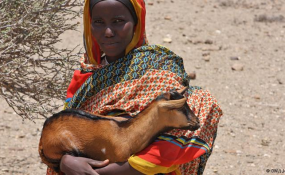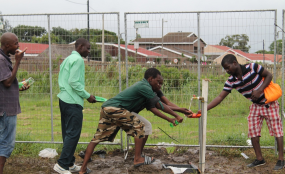Month: March 2017
Mekele—Dallol and Semera—Afdera Power Supply for Industrial Development and Access Scale up Project (MDSAPIAP)
BENIN/TOGO : PROJET DE REHABILITATION DE LA ROUTE LOME- COTONOU (PHASE 2) ET DE PROTECTION COTIERE
URBAN WATER SUPPLY and SANITATION PROJECT (UWSSP)

Uganda: Stealing By Staff Killed Uganda Telecom Limited – Managing Director
By Martin Luther Oketch & Eronie Kamukama
Kampala — Thieving and other fraudulent practices by employees alongside a mountain of debt weighed down Uganda Telecom (UTL) and stymied its operations, a senior executive revealed yesterday, a day after the government took over the business.
Mr Mark Shoebridge, the UTL managing director, said “this company had the problem of fraud and theft of money that was being executed by some people internally.”
He provided no figures of the losses to the firm as a result of inside pilferage since 2008, but said the fraud had reduced by 53 per cent over the past year when he took charge.
Hours after the revelations were made at a press conference, state minister for Privatisation Evelyn Anite, said the Auditor General’s office, on her request, has commenced financial, technical and institutional audit of UTL following an initial hesitation. The auditors were reluctant to carry out the audit in order to avoid duplication since Parliament is yet to conclude its inquiries into allegations of fraud and impropriety at the company.
The Libyan government, through Ucom Ltd, in 2000 bought 51 per cent of UTL shares, reducing the government to a 31 per cent minority shareholding.
The Libyans, however, walked out of the business — its five representatives on the board stopped funding and all resigned — as Parliament’s select committee closed in on the suspected culprits.
Minister Anite confirmed yesterday that the Libyans formally notified the government of their withdrawal, but did not say whether the government raised any objections or sought alternative ways to recover lost monies.
“UTL is now under [full control of the] government,” she said, referring to a decision that Finance minister Matia Kasaija said a day earlier paves the way for a new strategic partner to inject capital, technical and managerial expertise.
Mr Shoebridge told a press conference in Kampala earlier yesterday, that UTL last invested in infrastructure upgrade in 2007 and the technology and equipment have become obsolete and unreliable for high quality services amid growing telecommunications sector competition.
Being formerly a part of a government parastatal, the Uganda Posts and Telecommunications Corporation, enabled the entity have physical foothold with 480 towers across the country and managing fixed telephone lines for government ministries, department and agencies.
Poisoned chalice
In many ways, bureaucrats rely on UTL as principal telecommunications services provider, and particularly State House and security agencies.
That opportunity unexpectedly turned into a poisoned chalice, and the company is presently demanding Shs18b from government clients.
With 700,000 subscribers, UTL ranks among four biggest telecommunication service providers in the country, although other private players — to which it owes substantial monies in interconnection fees — eclipse its clientele.
These woes yesterday made it a subject of discussion in Parliament, with the company’s board chairman Stephen Kaboyo telling lawmakers that Uganda Revenue Authority on Monday, this week, “seized Shs1.1billion shillings from the UTL account”.
UTL has a total debt portfolio of Shs100b, he said, and requires a minimum $48m cash injection to upgrade the infrastructure and revamp its business that employs 500 people.
Part of the company’s tribulation was that its operations were being directed off-site by majority shareholders based in Tripoli, Libya, and with less consultation and blind to business realities on the ground. However, Mr Kaboyo said during the course of 2016, UTL’s business performance improved by 53 per cent, the best position the company has enjoyed in as many years.
Ucom’s rocky business marriage in Uganda was unsurprising to industry insiders. The firm encountered similar headwinds in both Zambia and Rwanda where its businesses went burst, and it has a foothold only in Ivory Coast.
UTL’s current top managers include board chairman Kaboyo, managing director Shoebridge and government representative Moses Mwase; a director in the Privatisation Unit.
Downsising
Mr Kaboyo hinted that the firm, which hopes to conclude business rescue and revamp talks with the government over the next couple of months, will likely downsize, raising the spectre of possible staff sacking in a distressed economy. “Going forward, he said, we need to take a look either ways: downsizing the number of staff or increasing the number of staff but it is not going to be immediate that people are going to lose jobs.” he said.

Ethiopia: Seminar Aims to Lure Dutch Companies
By Tsegay Hagos
The Netherlands-African Business Council (NABC) has planned to host seminar in Amsterdam in collaboration with the Ethiopian Embassy to the Benelux, the Baltic Countries and the EU.
The Seminar themed: ‘Doing Business in Ethiopia’ would attract Dutch companies to invest here, according to the Ethiopian Embassy in Brussels, Belgium.
Companies that engaged specifically in oilseeds, vegetables, dairy, poultry, spices, textiles, and logistics and construction sectors will be encouraged to invest in Ethiopia.
Dutch companies operating in areas including manufacturing of leather and leather products, sugar and related, chemical, pharmaceutical industry and medical devices, metal and engineering are invited to participate in the seminar, the Embassy stated.
The statement further elaborated that high-level delegation from Ethiopia, including the Special Advisor to the Prime Minister and representatives of the Ethiopian Investment Commission will be expected to attend the seminar which will be hosted by the Common Fund for Commodities in Amsterdam.
The Netherlands is the leading European country with largest number of companies in Ethiopia, it was learnt.

South Africa: Why Did It Take Absa Bank Limited 15 Months, or 312 Days, to Close the Guptas’ Bank Accounts?
PRESS RELEASEBy David Maynier MP
Today, I wrote to Maria Ramos, Chief Executive of Barclays Africa Group Limited, requesting a reasonable explanation for why it took Absa Bank Limited (“Absa”) 15 months, or a full 312 working days, to close the Guptas’ bank accounts in South Africa.
An affidavit, submitted by Yasmin Masithela on behalf of Absa, in the Minister of Finance versus Oakbay Investments (Pty) Ltd case, which is before the High Court of South Africa, Gauteng Division [Case No. 80978/16], reveals that it took the bank:
13 months, that is a full 272 working days, from the time the decision was taken to terminate the banker-client relationship with the Guptas’ (18 November 2014) to the notice of termination of the banker-client relationship with the Guptas’ (18 December 2015); and
15 months, that is a full 312 working days, from the time the decision was taken to terminate the banker-client relationship with the Guptas’ (18 November 2014) to the termination of the banker-client relationship with the Guptas’ (16 February 2016).
The affidavit provides a detailed explanation of why the Guptas’ bank accounts were closed, as well as a detailed explanation of the process followed in closing the Guptas’ bank accounts, but does not provide any explanation as to why it took so long to close the Guptas’ bank accounts.
What the delay in closing the Guptas’ bank accounts suggests is that Absa may have failed to comply with processes, procedures and controls to manage money laundering and terrorist financing risks, including its obligations in respect of “Politically Exposed Persons”, in terms of the Banks Act (No. 94 of 1990) and the Financial Intelligence Centre Act (No. 38 of 2001).
In the end, the real question, in the controversy surrounding the closure of the Guptas’ bank accounts, is not why the Guptas’ bank accounts were closed, but why it took so long for the Guptas’ bank accounts to be closed, by inter alia Absa.
David Maynier MP
DA Shadow Minister of Finance

Uganda: Govt Plans Shs 54bn for Early-Maturing Seeds
By Sadab Kitatta Kaaya
Government has set aside Shs 54bn to purchase early-maturing seeds for farmers this season in response to famine that has ravaged different parts of the country.
According to the minister of agriculture Vincent Bamulangaki Ssempijja, the money is part of the additional funding that the ministry has received to increase food production in the country.
Ssempijja was speaking at a two-day agriculture sector strategic plan meeting at Sheraton hotel last week on the domestication of the Malabo declaration on accelerated agricultural growth and transformation for shared prosperity and improved livelihoods.
The declaration was signed by African heads of state in the Equatorial Guinea capital, Malabo, during the 23rd ordinary session of the African Union (AU) in 2014.
While African presidents committed to increase agricultural funding with hope of ending hunger by 2025, there is hardly anything to write home on Uganda’s part.
“The [agriculture] sector acts as a major source of livelihood for the majority of the population of Uganda…,” Ssempijja said.
Due to changing climatic patterns, agricultural productivity has gone down with a reported huge crop failure of the maize crop across the country last season.
At least ten million Uganda are at risk of starvation after their crops failed in the past couple of seasons due to drought.
The current rains are expected to last till June, a period that government hopes will be sufficient for production of enough food to feed the country through to the next planting season.
“We have also got additional funding of Shs 67bn under the water for production component in the ministry of water and environment which we intend to use
for construction of irrigation systems so that the farmers can be able to grow crops even outside the rain seasons,” Ssempijja said.
On the sidelines of the meeting, Ssempijja told The Observer that his ministry intended to invoke the Plant Variety Protection Act to guard farmers against fake seeds, pesticides and fertilizers.
This is after farmers across the country complained of non-germinating seeds distributed under Operation Wealth Creation (OWC).

Ethiopia: Drought Emergency Spirals in Ethiopia Amid Major Aid Shortages
By Katy Migiro
Nairobi — Almost 13 million people across the Horn of Africa need aid due to drought
Millions of drought-stricken Ethiopians needing food, water and emergency medical care are not receiving it due to funding shortages, the United Nations said, warning the crisis will worsen if spring rains fail as predicted.
Some 5.6 million people need food aid in the Horn of Africa nation, which has been hit by a series of back-to-back droughts.
“The needs relating to the developing emergency exceed resources available to date,” the U.N.’s Office for the Coordination of Humanitarian Affairs (OCHA) said on Monday.
“Each day without food assistance exponentially increases human suffering, lengthens the recovery period of affected people, puts increasing pressure on humanitarian and development systems, and the interventions become that much more expensive.”
It is three times cheaper to treat children who are moderately, rather than severely, malnourished, it said.
But it takes at least four months to procure, ship and deliver emergency supplies to Ethiopia, it said.
The U.N. appealed for more than $900 million in aid for Ethiopia in January.
Almost 13 million people across the Horn of Africa need aid due to drought, including 2.7 million in Kenya, 2.9 million people in Somalia and 1.6 million people in Uganda, OCHA said.
The situation is expected to worsen across the region as the “belg” Spring rains are predicted to fail.
“The expected below normal rainfall will negatively impact belg land preparation and planting, as well as water and pasture availability; with a spiral effect on food and nutritional security of affected communities,” OCHA said.
At least $2.7 million is required each week to provide water via more than 600 trucks to millions of people, mostly livestock herders in southern Ethiopia, but there is only funding for 300-odd trucks, OCHA said.
Humanitarians are already short of cooking oil to distribute to hungry Ethiopians, with pulses and cereals likely to run out in the next few months, OCHA added.
There is also no money to deploy emergency medical teams and health supplies to southern areas not covered by health facilities, it said.
Eastern and southern Africa were hard hit in 2016 by drought exacerbated by El Nino – a warming of sea-surface temperatures in the Pacific Ocean – that wilted crops, slowed economic growth and drove food prices higher.
Reporting by Katy Migiro @katymigiro; Editing by Astrid Zweynert.

South Africa: Cape Water Restrictions to Remain Until Dams Reach 85 Percent
Water restrictions in the Western Cape will remain in place until dams have reached 85% of their capacity, Minister in the Presidency Jeff Radebe said on Thursday.
Cabinet was looking at ways to help the province should the current water supply run out, he told journalists at a post-Cabinet briefing.
“Attempts need to be instituted to provide greater comfort in the form of additional alternate water supply sources that must be on standby should inadequate water be received for this season,” he said.
To curb excessive water use, the Department of Water and Sanitation had informed the agricultural sector of 10% additional water restrictions.
Radebe welcomed the “much-needed rains” in other parts of the country. He warned of the possibility of flash flooding and said government was ready to act should this happen.
South Africa would host the Unesco-proposed World Water Day on March 22, under the theme, “Waste Water: the untapped resource”.
President Jacob Zuma is expected to open the event, and launch the World Water Development Report 2017 on waste water.
Source: News24
